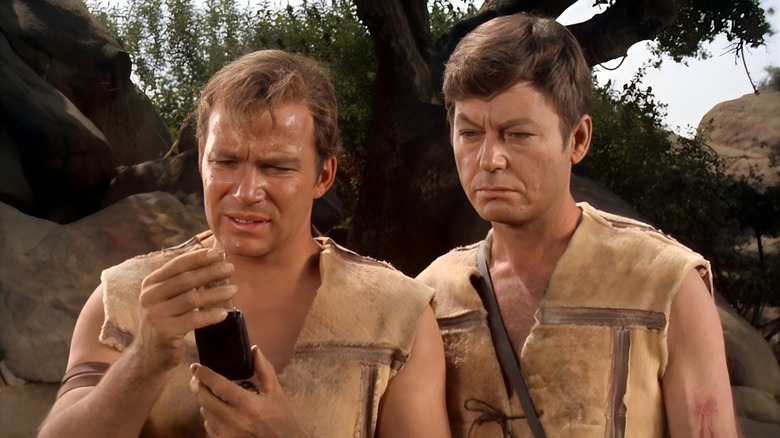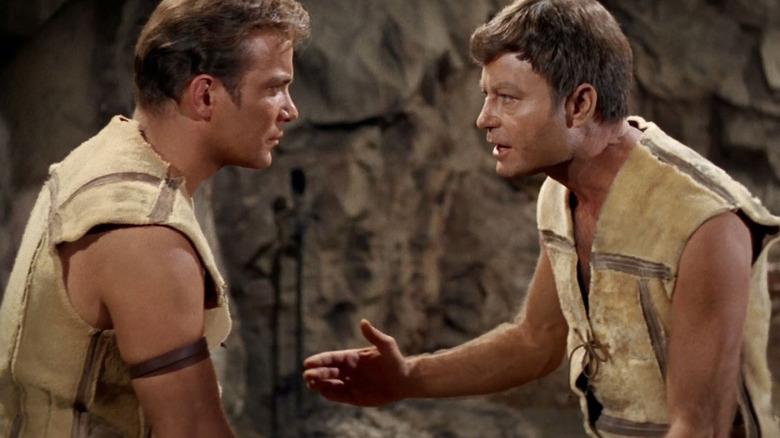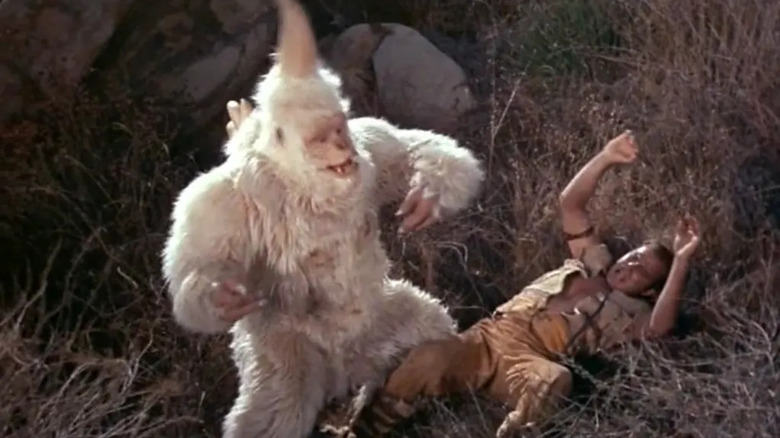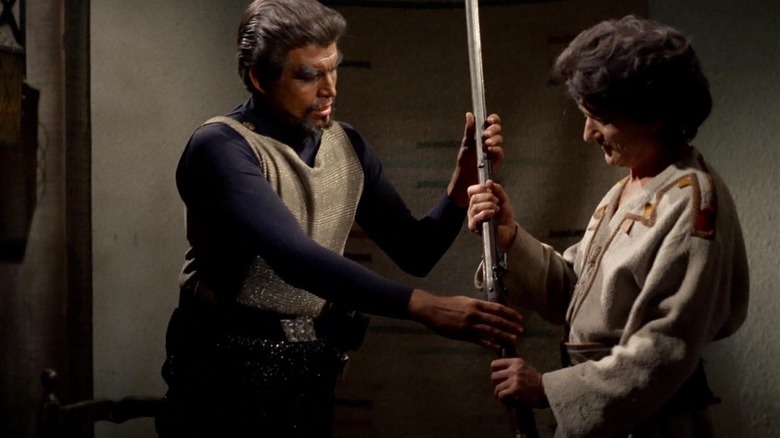One Of The Weirdest, Most Controversial Star Trek Episodes Demands A Closer Examination
The nineteenth episode of the second season of "Star Trek," called "A Private Little War" (February 2, 1968) has long been viewed as a metaphor for the Vietnam War. It involves the proliferation of arms, the deliberate involvement in another nation's civil war, and the nature of the Prime Directive. It also ends on a line of dialogue that can be read one of two ways. To this author, the ending of "A Private Little War" is clear. A quick poll of Trekkies, however, finds that many others interpret the ending in the opposite way. Let us delve.
At the beginning of "A Private Little War," Captain Kirk (William Shatner) and Commander Spock (Leonard Nimoy) are visiting a placid planet called Neural. The visit is leaving Kirk feeling nostalgic, as this planet was the site of his first planetary survey when he was a mere lieutenant some 13 years prior. Kirk points out that the natives have not evolved to develop weapons, and have never fought in any wars. They are, as civilizations go, developmentally unusual, as they have stayed at the same level of agrarian technology for centuries. "Innocent," technology-free Eden-like alien species were common in the early days of "Star Trek," and Gene Roddenberry, for however much he touted his particular utopian future, clearly felt that naturalist hippie communes were the real utopia.
The stinger: it seems the people of Neural have suddenly been given access to simple flint-lock-style rifles. Kirk and Spock had to remain hidden because of the Prime Directive; appearing to the Neuralans in their Starfleet uniforms would adversely alter their natural evolution. While fleeing the ensuing Neural gun battle, Spock is injured. What is happening?
What is happening
Kirk and Dr. McCoy (DeForest Kelley) return to Neural in disguise, and Kirk sets out to get information from a local man named Tyree (Michael Witney), whom he met 13 years ago. Kirk is immediately injured by a poisonous ape monster, thickening the plot. Most of the episode's story is devoted to his recovery and its connection to a ritual betrothal. This is fine for 1960s TV drama, and it's all scripted well enough, but the real meat of the episode comes later.
Where did the flint-lock rifles come from? Kirk and McCoy, trying to keep their high-tech devices secret, find a local forge where the guns are manufactured. A deep scan reveals that the technology is not from Neural. It's eventually revealed that a Klingon named Krell (Ned Romero) has been giving the rifles to the people of Neural to perpetrate a civil war. Krell hopes that the Hill People will wipe out the Village People and, once victorious, presumably welcome the Klingon Empire.
When Kirk hears that the Hill People will soon receive newer, superior weapons from the Klingons, his response is to arm the Village People (the ones he was closer to 13 years ago) with equally powerful weapons. Kirk is concerned with saving lives, and keeping the playing field level, as it were. McCoy instantly points out that Kirk's tactics will assure nothing more than perpetual conflict where many people on both sides will die. Kirk reasons that, since the Prime Directive has already been broken by the Klingons, why not keep things equal?
In terms of "Star Trek" philosophy, McCoy has the moral high ground. It is Kirk who must change his mind.
To this author, he will eventually. To other viewers, however, he will not.
Serpents
As previously stated, "Star Trek" is, at its best, a show that advocates pacifism. War is anathema to Roddenberry's dystopia. That doesn't mean, however, that many of the characters on it are not still drawn to war and violent conflict as a matter of course. Kirk, a tactician at heart, is quick to think of a battlefield solution to the Neural conflict, hoping to solve the problem as it appears in front of him. McCoy, ordinarily the more passionate character, has to remind Kirk that perpetuating a conflict is the worst possible idea. Getting Starfleet involved in another world's civil war will only result in an extended, death-fueled quagmire. One can see now why so many Trekkies consider "A Private Little War" to be explicitly about America's involvement in the Vietnam conflict.
If you're going to arm one side in a conflict, how far is that from the Enterprise merely using phasers to wipe out the other side in a single day? The slope is slippery.
The episode ends with Kirk and McCoy calling the Enterprise after a particularly bloody battle. Although McCoy objects, Kirk requests that the Enterprise make a supply of flint-lock rifles so that he may distribute them among the Village People. Kirk is not happy about his decision, but, ever the tactician, feels it's best. Scotty (James Doohan) is confused by the request and asks for clarification. What does he want? Kirk sighs. "Serpents," he says, "for the Garden of Eden." He then announces that he's very, very tired and would like to come home.
Kirk's weary serpent metaphor was, to my eyes, his change of heart. When Scotty questioned his orders about the rifles, he realized how wrong it was. His exhaustion was from war in general. He wanted to wash his hands.
Did Kirk help the war effort or not?
Kirk, however, did give the order. He may have seen that he was letting serpents loose into the Garden of Eden — the Biblical metaphor was first offered by McCoy earlier in the episode — but many feel that he was determined to muddy the waters regardless. In a situation where otherwise peaceful people are being forced into conflict by a malevolent government (Klingons), what is the morally correct thing to do? Does one select a side and help it win? That would mean being directly complicit in the deaths of the other half. If one stays back, however, wouldn't that mean tacitly approving of the deaths of the first half? Kirk is in a conundrum.
To my eye, Kirk changed his mind. He knew that, in stepping away, he'd be letting the Hill People win, but the alternative was an endless quagmire. He saw that he was spreading more serpents, and opted out. Others, however, see "A Private Little War" as the tragedy of war's inevitability. As such, for them, Kirk definitely selected to distribute weapons to the Neurals, despite their destructive power.
These are two very different tragedies. In one — a lamentation about war — Kirk steps away, knowing people will die, hoping that the war will eventually end. In the other, Kirk experiences a moral downfall. He sells his soul to keep the war going. To this author, the former is more in keeping with the spirit of "Star Trek." Many may disagree.
The Trek thing to do, of course, would be to prevent the Klingons from distributing weapons and destroying the ones that have already been given out. But that would be something Captain Picard might do.



